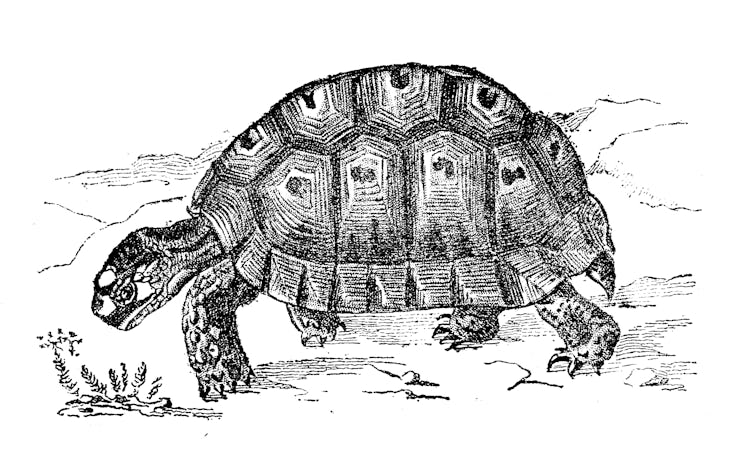A unique trait shared by tortoises and humans changes a scientific belief
Solo or social, faces are important across the animal kingdom.

Babies aren't the only creatures with an affinity for human faces. Studies in various animals, including monkeys, dogs, and chickens, demonstrate an attraction to a person's face — or at least the shape of two eyes and a smile.
In animals that are raised under a parent's care, this is perhaps understandable. We know that human infants inherently understand what a face looks like. Days after birth, babies are drawn to their own mothers, preferring them to other faces.
However, not all species have such a parental bond. Recently, scientists examined whether a knack for responding to faces in inherent in solitary species as well. The answer, they claim, hints at whether or not preferring faces early in life is common across animals — a shared trait, linked by evolution.
A new study suggests the answer is yes. The land tortoise genus Testudo tends to ride solo — that is, they go without parental care after hatching. Despite this lack of parental attention, moments after hatching, the tortoises are drawn to shapes that resemble a face, the study finds.
Researchers placed newly hatched Testudo tortoises in a box with an object at each side. The object either resembled a face (two eyes and a mouth/nose) or another shape — an upside-down face, for example.
The research subjects included 136 tortoises across five Testudo species. Seventy percent of the time, the tortoises preferred the face shape. They would orient themselves toward the object configured to look like a face, as seen below.
Newly hatched Hermann's tortoise approaching a face-like object.
Since these tortoises are solitary animals, the research supports that faces are important to both social and solitary species. That lends support to the notion that animals' attraction to faces evolved earlier than expected.
The findings were published on Monday in the journal Proceedings of the National Academy of Sciences.
Anti-social tortoises — Members of the Testudo genus don't have any post-hatching parental care, which suggests they have evolved without parental care for at least 30 million years.
These tortoises don't gather in cohesive social groups, and they avoid other members of the same species. As the study authors write, "from the beginning of life, they are not gregarious."
The new study demonstrates how tortoises that are well-established as anti-social are still attracted to faces. It follows that, evolutionarily, preferences for faces must predate the bonds of parental care.
The study authors reason that facial preference is an ancient mechanism, dating back to the ancestors of both reptiles and mammals. And, as the tortoise experiments show, it may be key to the evolution of both highly social animals, like humans, and loner tortoises.
Abstract: At the beginning of life, inexperienced babies and human fetuses, domestic chicks, and monkeys exhibit a preference for faces and face-like configurations (three blobs arranged like an upside-down triangle). Because all of these species have parental care, it is not clear whether the early preference for faces is a mechanism for orienting toward the conspecifics and sustaining parental care, or a more general mechanism to attend to living beings. We contrasted these hypotheses by testing inexperienced hatchlings of five species of tortoises, solitary animals with no parental care. If early face-like preference evolved in the context of parental care, solitary species should not exhibit it. We observed that visually naïve tortoises prefer to approach face-like patterns over alternative configurations. The predisposition to approach face-like stimuli observed in hatchlings of these solitary species suggests the presence of an ancient mechanism, ancestral to the evolution of reptiles and mammals, that sustains the exploratory responses, and potentially learning, in both solitary and social species.
This article was originally published on